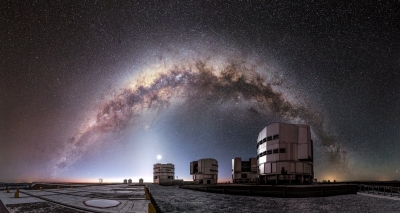The exceptional global conditions due to the Covid-19 pandemic have deeply affected science operations at ESO observatories, causing an unprecedented backlog of observations for high-priority programmes, including Large Programmes. ESO is studying a variety of measures to complete those programmes at the earliest possible time once operations are resumed, which may require the exceptional suspension of the Call for Proposals for Period 107 (April-October 2021). While the decision is not firm yet, researchers preparing or planning to submit proposals for Period 107 should take into account that such suspension is a real possibility.
Possible suspension of P107 Call for Proposals

The ongoing Covid-19 pandemic is having a strong impact on the ESO observatories, where science operations have been suspended since late March 2020. Unfortunately, this will lead to the loss of most if not all of the observing time allocated in Period 105 (April-September 2020). At the moment, ESO has planned a safe, progressive ramp-up of operations as soon as conditions allow, aiming to reduce the impact on those high-priority scheduled programmes whose targets will be still observable before the end of the period. It is already clear, however, that at best only a small fraction of the time committed will be available. Furthermore, at the present time it is not possible to guarantee that full science operations will have been resumed by the beginning of Period 106 (October 2020-March 2021).
The major loss of observing time caused by the pandemic has a particularly strong effect on observing time committed to high-priority programmes, creating a backlog of unprecedented volume. Given the visibility window of targets that could not be observed in Period 105, most of the backlog can be alleviated only at the expense of the time available in Period 107. Moreover, any backlog absorbed during Period 106 will be at the expense of the time that would normally have been available to newly approved programmes in that Period. This will add considerably to the pressure on the observing time in Period 107. In addition, delayed technical activities at the observatory, including the installation and upgrade of new instrumentation, will have to be re-scheduled in the coming months in time slots that would have been normally allocated to scientific observations.
ESO is conducting an exhaustive analysis of the situation considering the backlog, the time allocation in Period 106, the time required by technical activities at the Observatory, and an emerging, obvious conclusion is that the time available for new programmes in Period 107 will be at most a small fraction of the total science time available during the semester. While ESO is still working to estimate, as accurately as currently possible, the total amount of science time expected to be available in Period 107, the scenario to not issue a normal Call for Proposals for Period 107 is being seriously considered. This would be an unprecedented step in the history of ESO. It is clear that such a step cannot be taken without a careful assessment of its scientific impact on the ESO community. In particular this will require a plan to offer alternative submission channels, which ESO will develop in consultation with its governing bodies, with the ultimate goal of safeguarding access to the observing facilities for the execution of high-priority observations.
At the time of writing, all these aspects are being studied in depth and a decision will be made as soon as possible. In the meantime, researchers who are preparing or planning the submission of proposals in response to the next Call should be aware of the real possibility of suspension. ESO will inform its community promptly of further developments and decisions.
Feedback should be preferentially channeled through the members of the Users Committee
